Interviews
Truth & Salvage Co. Blends Country and Hollywood
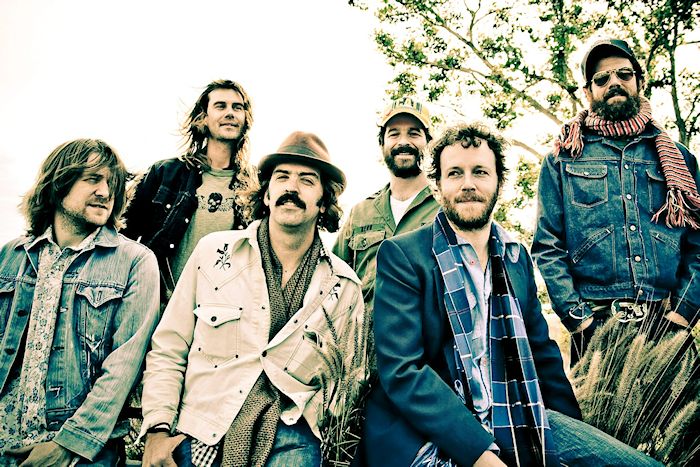
Phish had Nectar’s. The Doors had The Whisky. And Truth & Salvage Co. had Crane’s.
Crane’s Tavern, one of Hollywood’s best kept secrets, to be exact. Crane’s is home to cheap drinks, great people and even better music. Situated on the unpretentious N. El Centro Avenue—between the famous Hollywood Boulevard and Sunset Strip—the club is considered ‘off the beaten path’, a sanctuary from the glitz and glamor of Tinseltown.
On a night when all the planets and stars seemed to align, six guys came together and embarked on a musical journey that Hollywood itself would be hard pressed to match.
Arriving in Los Angeles from various cities including Atlanta, New Orleans, Indianapolis and Tupelo, each member has roots in a different past.
“We all have varying stories that brought us to L.A.,” says singer and guitarist Scott Kinnebrew. “And we found ourselves in Hollywood with a host of clubs that really treat you as a number. You bring your draw and you play that game and we did, and we discovered we weren’t getting paid from it and it wasn’t very much fun. It was really cool to play the clubs but not much reward in it.”
And that game–the rules of which are common knowledge in Hollywood—is “pay to play.”
It’s a loaded term which refers to a variety of situations in which money is exchanged for services or the privilege to engage (play) in certain activities. Pay to play extends across all lines in the entertainment industry, making news, making lawsuits (Smashing Pumpkins, Alec Baldwin) and making bad music.
For musicians, pay to play means they are required to pre-buy “X” amount of tickets for their performance, and then, hopefully, re-sell them for their show. The club always makes its money, but the musicians rarely make theirs. During the 90s, the adoption of “pay to play” tactics by clubs like The Roxy, The Whiskey and Gazzari’s (now the The Key Club), not only diminished those clubs’ appeal to musicians but effectively destroyed the once-great live music scene on the Sunset Strip.
“There really weren’t a ton of bands when we first got to L.A.,” says Kinnebrew. “I’d go and try to seek out bands and try to find a community, and we kind of had to develop our own. And then we started playing this club called Crane’s. They had just gotten their beer license, and we started playing with my friend Lissie who lived down the street from us. Crane’s offered her to book a night of music on Wednesdays. At Crane’s, we would invite whoever we knew to come and play. A lot of them were singer/songwriter. We all did it together and it was called the Beachwood Rocker Society. It still goes on now.”
Los Angeles is a hard city. In parts of town, the median value of a house is upwards of half-a-million dollars, according to CityData.com. The average rent for a one bedroom apartment? $1000 per month, give or take (no utilities included, of course). What? You want a door with that? That’s gonna cost ya, Mister.
It is a city that will squash you flat and then run over you a few times with its F-150 Hummer, just for good measure.
Survive in L.A. and you can survive anywhere.
“Back on the east coast, I was able to buy a house. It was so cheap over there. I was able to live and tour and make a living as a musician,” says Kinnebrew. “As soon as I moved to L.A., it was like there was no way of paying rent that way, so we all had to get jobs and do stuff. I’d be working a day job, Walker [singer and keyboardist] would be working nights, Smitty [singer and drums] would be out in the desert for a week. We worked all the time. We could never rehearse because we were always working. But we got together on Wednesday nights at Crane’s and played, and backed up other people, and it developed into this really loose organic thing that did not have any type of expectation at all. And it just started being fun.”
The boys were having a lot of fun. They were involved in freelance and side projects, working with bands such as Scrappy Hamilton and Old Pike. They were also performing and collaborating with players like The Moldy Peaches, Ben Folds Five, Jack Johnson, and The Squirrel Nut Zippers, as well as members of My Morning Jacket and Rogue Wave.
The City of Angels is not without her merits though. Play hard, work harder, prove yourself, accept L.A. as the moody mistress she is, and maybe—just maybe, you’ll get lucky.
And part of that luck is found on the stage of the famous Hotel Café on Cahuenga Blvd., a well known and respected vestige of the singer/songwriter scene. With exposed brick walls, hardwood floors and a stage that has proven ability to launch dreams and start careers, Hotel Café is ground zero.
“We always wanted to play at Hotel Café,” says Kinnebrew. “Timmy, who booked Sunday nights at the Hotel Café, started coming over to Crane’s and he liked what he saw. We would just go nuts and have a good time. It was a crazy party and people would go bonkers and it was a fun freak scene on Wednesday nights. Timmy became our friend through Crane’s.”
Tim Jones, then the talent booker at Hotel Café, invited Truth & Salvage to play on Sunday nights.
“Hotel Café helped us get more L.A. credibility,” says Kinnebrew. “But Crane’s was the party of all parties.”
Later, the band was invited to go play in Vegas (under the name Scrappy Hamilton), but Kinnebrew couldn’t get out of his day job. So, Tim Jones was invited to go along, which he did. They had a really great time, sounded pretty cool, and upon their return, started playing together.
“It was probably the best thing in the world that I wasn’t there at that gig, because it opened up this whole new idea. We had never had any other gigs as our group, except Wednesday night at Cranes. So, they got back into town and we all started playing together. There was Lissie, and this guy who played trumpet in the band. We were called the Denim Family Band and we sang songs about blue jeans.”
One of the songs was called Them Jeans, and Gap made a video from it and it eventually incorporated into an iPod/iPhone app.
Cut to a year later. Truth & Salvage Co. is still having fun, still digging the L.A. scene, still playing together, with no expectations. And then they are invited to play in Vegas again. This time, Kinnebrew was able to go.
“The person who invited us had seen us play on many occasions and he was like, ‘whatever you guys are doing now is really deserving of you taking it seriously. I know you are all having a great time and that’s what is making this so cool, but if you can just get serious about it, I really think that you have something that is golden.’”
The group heeded the advice and started, for the first time, rehearsing regularly.
Then, in true L.A. fashion—after sixteen years of ‘living the dream’, of paying dues individually and collectively—they got lucky.
“We were invited to showcase for Pete Angelus. It was the biggest gig we’d ever played in our lives, and it was in room with just Pete Angelus. Just him and just us.”
And ‘just him’ loved ‘just them’.
Angelus has worked in the music business since 1975, helping to form and transform bands like Van Halen and Hall & Oates. He has been the only manager of The Black Crowes since they began touring in 1990.
Angelus asked Truth & Salvage Co. to play for Chris Robinson, front man for The Black Crowes. After witnessing “The sincerity of their songwriting and passionate performance,” Robinson was sold, first taking the band on tour in 2009 as the Crowes’ opening act, and then producing the group’s self-titled debut album (released on May 25, 2010).
In 2009, Angelus added Truth & Salvage Co. to his already illustrious management roster.
In many bands, the singer/songwriter is the driving force. So what about six singer/songwriters on one stage, and one album, together?
“We were lucky to come out of the songwriter scene in Los Angeles, where we were the backing band for a lot of different players. We discovered that it’s a lot of fun. It’s pretty liberating to support somebody else’s song as much as it is to sing your own. You realize that you might be good, but you’re never going to be as good as you are when you’re playing with an awesome group of people. It’s easy to put down the torch and make something beautiful with other people.”
Filled with country sentiment, spectacular songwriting skills, kickass keys, badass bass and the occasional accordion and soaring harmonica, a Truth & Salvage Co. show is a boot stomping, swinging from the rafters, raucously energetic affair. But the City of Angels will always be part and parcel to group’s past and future.
“I really feel that L.A. made this band,” says Kinnebrew. “I think it was the death of the ego that we needed to get through, and I think moving to L.A. did it more than anything.”
- Lists13 years ago
Top 10 Country Music Albums of 2010
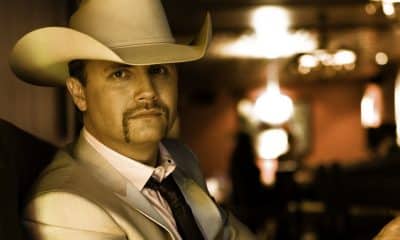
 Interviews5 years ago
Interviews5 years agoJohn Rich – The Interview

 Song Reviews16 years ago
Song Reviews16 years agoTaylor Swift – “Love Story”

 Interviews5 years ago
Interviews5 years agoHoneyhoney on Hiatus: Revisit our 2008 Interview with Suzanne Santo
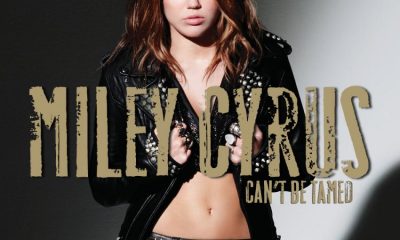
 Album Reviews14 years ago
Album Reviews14 years agoAlbum Review: Miley Cyrus – Can’t Be Tamed
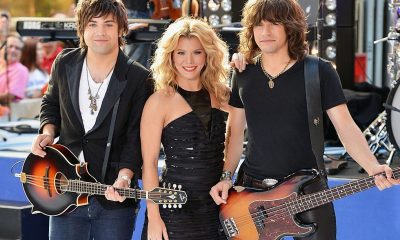
 Song Reviews6 years ago
Song Reviews6 years agoThe Band Perry – “Hip To My Heart”

 Columns5 years ago
Columns5 years agoThe Link Between Folk Music’s Past and Present
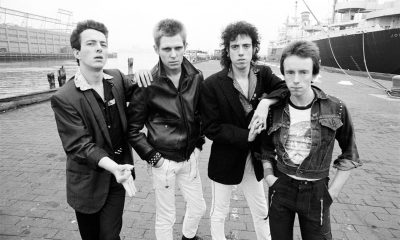
 Columns5 years ago
Columns5 years agoIs Marketing Killing Rock and Roll?

